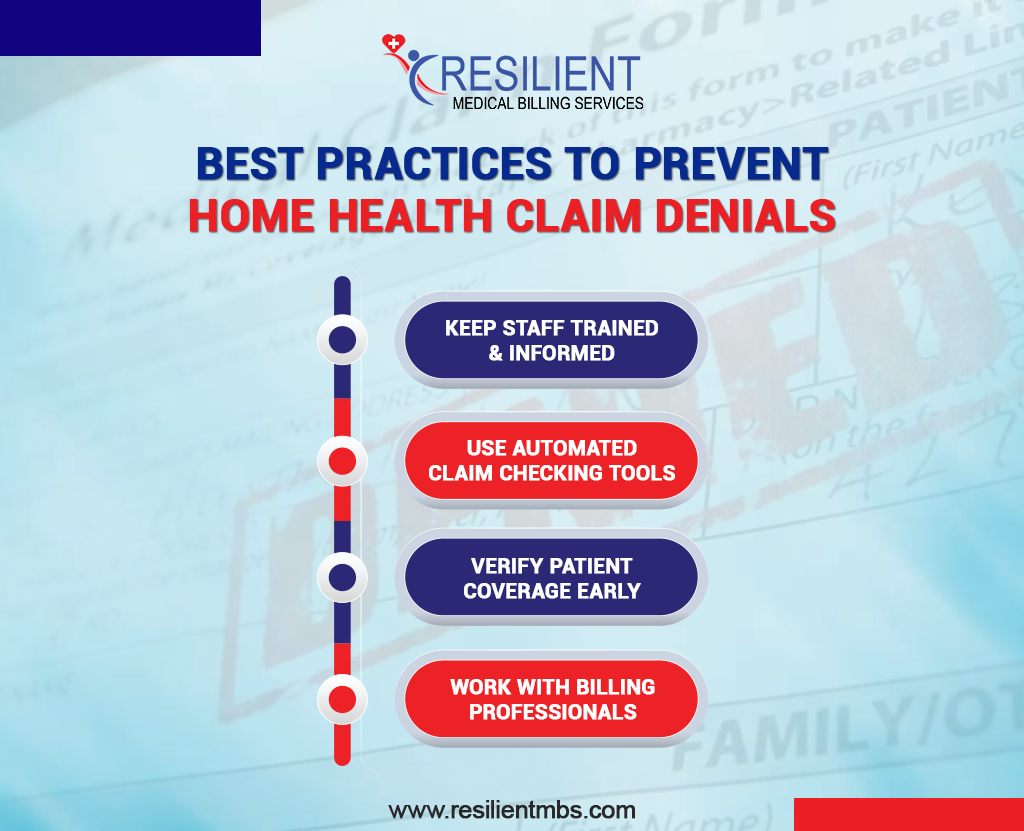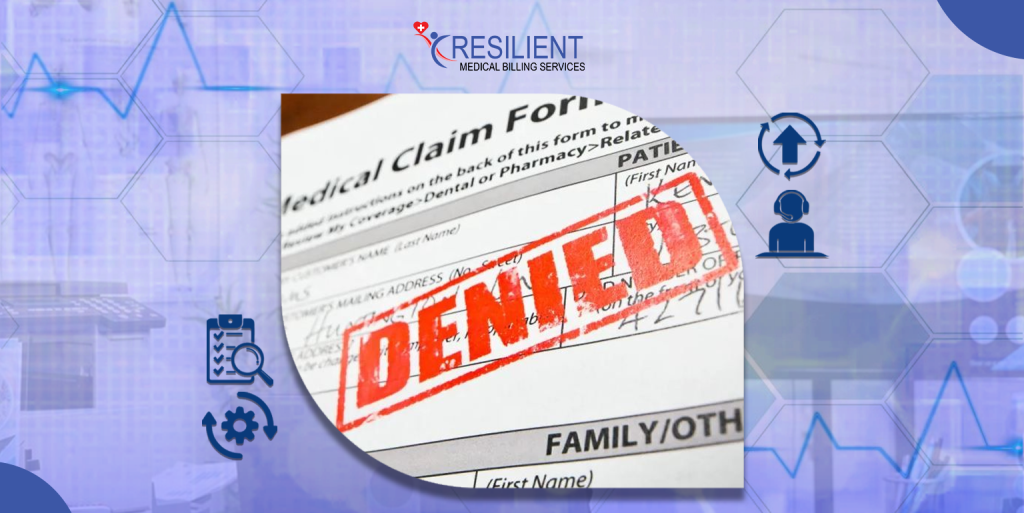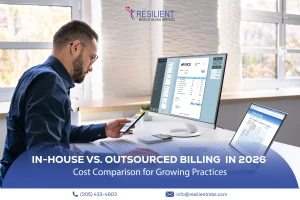Home health claims are requests that home healthcare agencies send to insurance companies to get paid for the care they provide to patients at home. To receive payment on time, these claims must be complete, accurate, and follow all insurance rules.
However, many agencies face a common problem that is denied claims. When a claim is denied, it means the insurance company refuses to pay, often because of missing information, coding mistakes, or other errors. These denials in medical billing can slow down payments, hurt cash flow, and make it harder for agencies to run smoothly.
This blog explains why home health claims are denied, how these denials affect your agency, and what steps you can take to prevent and fix them.
By understanding the process, agencies can improve billing accuracy, stay compliant, and protect their financial health.
Understanding Home Health Denied Claims
A home health denied claim happens when an insurance company refuses to pay for services because of mistakes, missing information, or not following coverage rules. In medical billing, this means the claim was received but not approved for payment.
Denied claims can slow down payments, increase paperwork, and create compliance issues. They often require extra work, such as adding documents or filing appeals, which adds time and cost. Since home healthcare involves detailed documentation and strict rules, managing claims carefully is key to keeping cash flow steady and payments on time.
Common Reasons for Home Health Claim Denials
1. Incomplete or Inaccurate Documentation
Missing or unclear patient records, care notes, or visit details are top reasons for claim denials. Insurance payers need complete and accurate documentation to confirm that services were necessary and provided correctly.
2. Missing Physician Signatures or Plan of Care Errors
Every home health claim must include a signed and dated plan of care from the doctor. Missing signatures or inconsistent information can cause the claim to be denied.
3. Incorrect or Outdated Patient Eligibility Information
Claims are often denied when patient insurance information is old, incorrect, or when coverage has ended. Checking eligibility before each visit helps prevent these issues.
4. Coding Errors or Wrong CPT/HCPCS Codes
Using the wrong billing codes to describe services can lead to denials. Accurate coding ensures claims match what was actually done and follow payer rules.
5. Missing or Incorrect Itemized Statement
An itemized statement lists all services provided, their costs, and codes. If it’s missing or not formatted correctly, the claim might be denied for lack of details.
By fixing these common issues early, home healthcare agencies can reduce health insurance claim denials, speed up payments, and improve overall billing accuracy.
The Role of Compliance and Documentation in Reducing Denials
Good documentation and compliance are key to getting home health claims approved. Accurate records and correct coding show the care provided and help meet insurance and government rules. When everything is documented correctly, claims are less likely to be denied.
Why Documentation and Coding Matter
Many claim denials happen because of missing or incorrect information. Every visit, treatment, and care plan should clearly explain why the service was needed and match the right billing codes. Clear, accurate documentation helps agencies stay compliant and get paid faster.
How Itemized Statements Help
An itemized statement in medical billing lists each service provided, such as nursing visits or therapy sessions. This detailed list makes it easier for insurance companies to review and approve claims quickly. It also prevents confusion and reduces the chances of claim rejections.
Common Compliance Pitfalls and How to Address Them
Home healthcare agencies often run into compliance problems like missing doctor signatures, incomplete care plans, or expired certifications. These small mistakes can lead to claim denials or even audits. To avoid them:
- Do regular internal checks to make sure all records are complete and accurate.
- Keep your team updated on the latest CMS and insurance rules.
- Use electronic health record (EHR) systems that have built-in compliance reminders.
- Building a culture of responsibility and accuracy helps reduce denials and keeps the agency’s finances healthy.
Best Practices to Prevent Home Health Claim Denials
Preventing claim denials starts with being proactive and organized. Here are some simple but effective steps:
1. Keep Staff Trained and Informed
Insurance rules and coding guidelines change often. Regular training helps staff stay updated and avoid costly mistakes.
2. Use Automated Claim Checking Tools
Claim scrubbing software can find errors or missing details before claims are submitted, helping ensure faster approvals.
3. Verify Patient Coverage Early
Check patients’ insurance eligibility and required authorizations before providing care. This prevents denials due to coverage issues.
4. Work with Billing Professionals
Partnering with experienced home healthcare billing companies can improve accuracy, reduce errors, and ensure faster payments allowing your team to focus on quality patient care.
How Billing Experts Make the Home Health Claims Process Easier
Outsourcing home healthcare billing to specialized professionals offers significant advantages for agencies striving to maintain efficiency and financial stability. Billing experts bring in-depth knowledge of payer requirements, coding updates, and compliance regulations helping agencies minimize errors and optimize claim success rates.

Benefits of Outsourcing to Specialized Billing Professionals
Working with certified billing experts helps home health agencies focus on caring for patients instead of managing paperwork. These professionals handle all billing and reimbursement tasks using advanced systems that track claims, fix errors, and follow up quickly.
Outsourcing saves time, reduces stress, and helps agencies get paid faster with fewer claim rejections.
How Experts Handle Denial Management, Appeals, and Compliance Checks
Billing experts carefully review each claim before sending it to the insurance company. They check all documents for accuracy and make sure they meet CMS and payer rules.
If a claim is denied, these professionals determine the reason, correct the issue, and resubmit it on time. Their ongoing compliance checks also protect agencies from audits and financial penalties.
Real-World Outcomes of Working with Certified Billing Teams
Agencies that partner with professional billing teams often see fewer denied claims, quicker payments, and better overall financial performance. These certified experts also use data to find ways to improve efficiency. This partnership allows agencies to stay financially strong while providing high-quality patient care.
Bottom Line
Many home health claims are denied because of missing details, incorrect codes, or not following insurance rules. You can prevent these issues by training your staff regularly, using tools that check claims automatically, and confirming patient eligibility before submitting claims.
Working with experienced billing experts helps ensure your claims are accurate and compliant, so payments come through on time. This allows your agency to focus more on patient care.
Good billing practices keep your home health agency financially strong. Contact Resilient MBS today to lower claim denials and improve your reimbursements.









